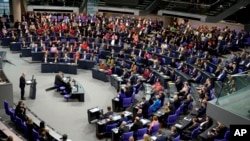German President Frank-Walter Steinmeier on Friday ordered the dissolution of parliament and new elections for Feb. 23 in the wake of the collapse of Chancellor Olaf Scholz’s ruling coalition.
Scholz lost a confidence vote on December 16 and is leading a minority government after his unpopular and notorious three-party coalition collapsed on November 6, when he fired his finance minister in a dispute over how to revive Germany’s stagnant economy. Had given.
Leaders of several major parties then agreed that parliamentary elections should be held on 23 February, seven months earlier than originally planned.
Since the post-World War II constitution does not allow the Bundestag to dissolve itself, it was up to Steinmeier to decide whether to dissolve the parliament and call elections. He had 21 days to take this decision. Once Parliament is dissolved, elections must be held within 60 days.
In practice, the campaign is already well underway. Polls show Scholz’s party trailing the conservative opposition Union Bloc led by Friedrich Merz. Environmentalist Greens Vice Chancellor Robert Habach, Scholz’s remaining partner in government, is also making a bid for the top job – although his party is trailing. If recent elections were held, the likely next government would be led by Merz as chancellor in coalition with at least one other party.
Key issues include immigration, how to shore up the slowing economy and how to best aid Ukraine in its struggle against Russia.
The populist, anti-immigration Alternative for Germany, or AfD, which is polling strongly, has nominated Alice Weidel as its candidate for chancellor, but she has no chance of taking the post because other parties are on board. Refuses to work.
Germany’s electoral system traditionally forms coalitions, and polls show that no party is close to an absolute majority on its own. Talks are expected to last for several weeks to form a new government after the elections.
This is only the fourth time that the Bundestag has been prematurely dissolved under Germany’s post-World War II constitution. This happened in 1972 under Chancellor Willy Brandt, in 1982 under Helmut Kohl, and in 2005 under Gerhard Schroeder. Schroeder used a vote of confidence in an early election won by centre-right rival Angela Merkel by a narrow margin.
